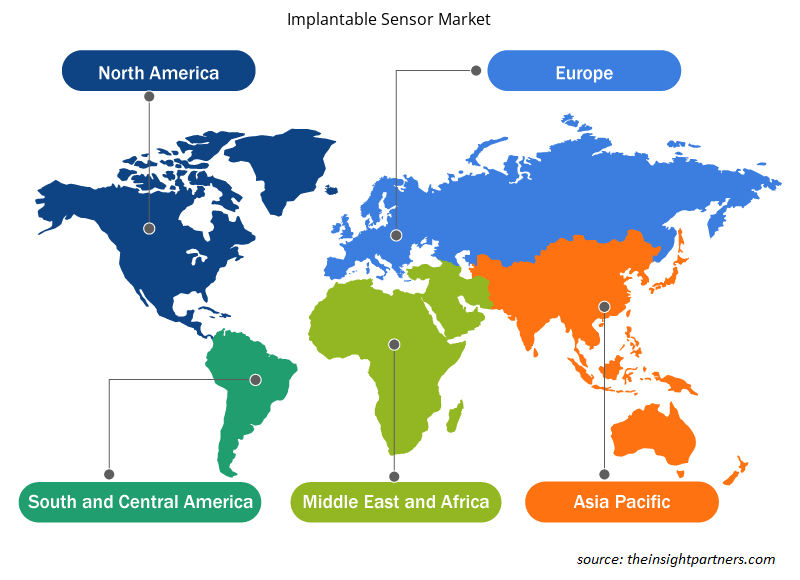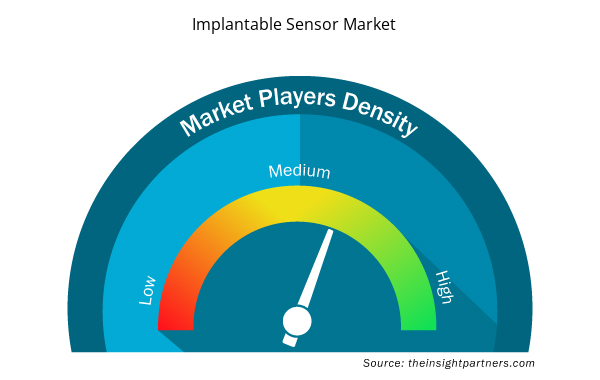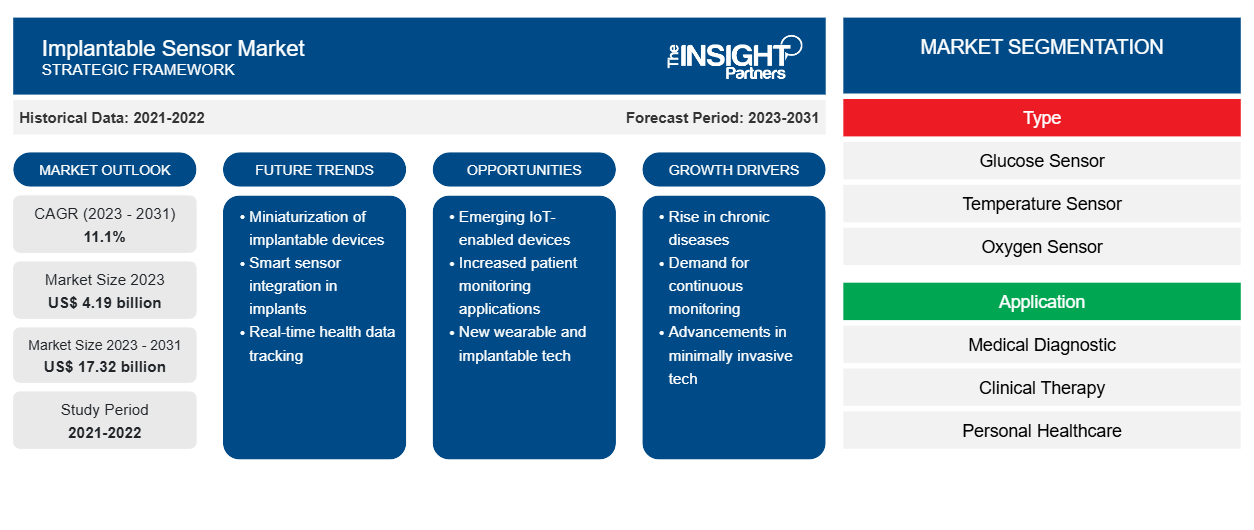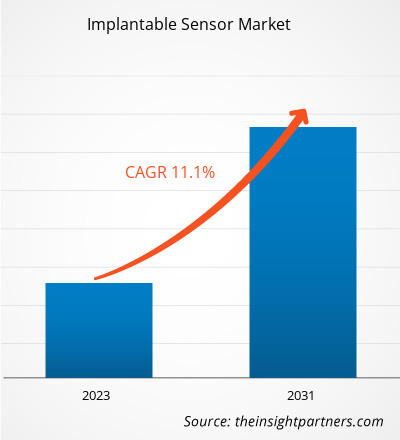植入式传感器市场规模预计在 2023 年为 41.9 亿美元,预计到 2031 年将达到 173.2 亿美元。
预计到 2031 年,复合年增长率将达到 11.1%。新型言语疗法的开发、替代性的沟通方法、增加新生儿听力筛查以及在言语疗法中使用人工智能可能会继续成为植入式传感器市场的关键趋势。
植入式传感器市场分析
植入式传感器是植入体内的小型医疗设备,用于观察人体的各种生理参数,例如温度、压力、血糖水平或药物浓度。此类产品在医疗保健行业受到了极大的关注。该设备能够向医疗保健专家提供实时数据,以便更好地管理慢性病或进行术前/术后监测。慢性病的日益流行预计将有利于新产品的开发并推动植入式传感器市场的发展。
植入式传感器市场概况
市场的增长归因于一些关键驱动因素,例如慢性病患病率的增加和移动医疗技术的日益普及。然而,新兴国家的低采用率是阻碍市场增长的主要因素。全球植入式传感器市场按地区细分为北美、欧洲、亚太、中东和非洲以及南美和中美。在北美,美国是植入式传感器的最大市场。该地区的增长归因于主要市场参与者的存在和不断增长的产品开发。此外,持续的产品开发有望进一步刺激北美植入式传感器市场的增长。预计亚太地区将占据植入式传感器市场增长最快的地区。
定制此报告以满足您的需求
您可以免费定制任何报告,包括本报告的部分内容、国家级分析、Excel 数据包,以及为初创企业和大学提供优惠和折扣
- 获取此报告的关键市场趋势。这个免费样品将包括数据分析,从市场趋势到估计和预测。
植入式传感器市场驱动因素和机遇
移动医疗技术日益普及,市场前景看好
移动医疗技术日益普及,通过智能手机、可穿戴医疗设备等提供便捷的医疗信息、监控和通信工具,彻底改变了医疗服务。这一趋势使个人能够掌控健康,促进远程患者监控,改善医疗服务的可及性,并改善整体患者体验。糖尿病、血压和心律失常检测等慢性疾病是全球植入式传感器市场份额的主要驱动因素。
政府对医疗技术的支持——植入式传感器市场
全球范围内,医疗研发活动的投资都在增加。根据《2016-2020 年美国医疗卫生研发投资报告》,2016 年至 2020 年,美国医疗卫生研发投资增加了 485 亿美元,增幅为 42%,而联邦投资则增加了 214 亿美元,增幅为 53.5%。2016 年至 2020 年,医疗技术投资也增加了 36.49%。因此,政府对先进医疗技术的支持将对植入式传感器市场产生积极影响,因为这为医疗器械制造商带来了机遇。
植入式传感器市场报告细分分析
有助于得出植入式传感器市场分析的关键部分是类型、应用和最终用户。
- 根据类型,植入式传感器市场分为葡萄糖传感器、温度传感器、氧气传感器、压力传感器等。软件部分在 2023 年占据了更大的市场份额。葡萄糖传感器部分在 2023 年占据了最大的市场份额,而氧气传感器部分预计在预测期内在市场上的复合年增长率最高。
- 根据应用,市场分为医疗诊断、临床治疗、个人医疗保健和成像。医疗诊断领域在 2023 年占据了最大的市场份额;然而,个人医疗保健领域预计将在 2024-2031 年期间实现最高的复合年增长率。
- 就最终用户而言,市场分为医院、诊所和诊断中心。医院部门在 2023 年占据市场主导地位,预计在预测期内将实现市场最高复合年增长率。
植入式传感器市场份额(按地区)分析
植入式传感器市场报告的地理范围主要分为五个区域:北美、亚太、欧洲、中东和非洲、南美/南美和中美。
北美占据了植入式传感器市场的主导地位。根据美国糖尿病协会的数据,到 2021 年,将有近 3840 万美国人(约占总人口的 11.6%)患有糖尿病,其中老年人口或 65 岁以上的人占大多数。由于该地区糖尿病发病率上升,北美在 2022 年占据了最大份额。对技术先进产品的倾向和全球市场参与者的存在是北美植入式传感器市场占据主导地位的因素。预计亚太地区将在未来几年以最高的复合年增长率增长。
植入式传感器市场区域洞察
Insight Partners 的分析师已详尽解释了预测期内影响植入式传感器市场的区域趋势和因素。本节还讨论了北美、欧洲、亚太地区、中东和非洲以及南美和中美洲的植入式传感器市场细分和地理位置。

- 获取植入式传感器市场的区域特定数据
植入式传感器市场报告范围
| 报告属性 | 细节 |
|---|---|
| 2023 年的市场规模 | 41.9亿美元 |
| 2031 年市场规模 | 173.2亿美元 |
| 全球复合年增长率(2023 - 2031) | 11.1% |
| 史料 | 2021-2022 |
| 预测期 | 2023-2031 |
| 涵盖的领域 | 按类型
|
| 覆盖地区和国家 | 北美
|
| 市场领导者和主要公司简介 |
|
植入式传感器市场参与者密度:了解其对业务动态的影响
植入式传感器市场正在快速增长,这得益于终端用户需求的不断增长,而这些需求又源于消费者偏好的不断变化、技术进步以及对产品优势的认识不断提高等因素。随着需求的增加,企业正在扩大其产品范围,进行创新以满足消费者的需求,并利用新兴趋势,从而进一步推动市场增长。
市场参与者密度是指在特定市场或行业内运营的企业或公司的分布情况。它表明在给定市场空间中,相对于其规模或总市场价值,有多少竞争对手(市场参与者)存在。
植入式传感器市场的主要运营公司有:
- ADI 公司
- DEXCOM 公司
- Glusense 有限公司
- 霍尼韦尔国际公司
- 美敦力
- 恩智浦半导体公司
免责声明:上面列出的公司没有按照任何特定顺序排列。

- 获取植入式传感器市场顶级关键参与者概述
植入式传感器市场新闻和最新发展
植入式传感器市场通过收集主要和次要研究后的定性和定量数据进行评估,其中包括重要的公司出版物、协会数据和数据库。以下是植入式传感器市场的发展和策略列表:
- 2023 年 12 月,Medstar 成为全球首家为晚期心力衰竭患者植入 Cordella 传感器植入物的公司。该传感器通过无线微机电传感器将患者的肺动脉压力远程发送给医生团队。有了这些实时数据,医生可以主动调整药物和疗法,以减少 HF 住院率。(来源:MedStar Health,新闻稿,2024 年)
- 2022 年 2 月,全球糖尿病护理公司 Ascensia Diabetes Care 宣布其合作伙伴 Senseonics Holdings, Inc. 已获得美国食品药品管理局 (FDA) 批准使用下一代 Eversense® E3 连续血糖监测 (CGM) 系统。Ascensia 计划向美国患者提供 Eversense E3 传感器,该传感器可使用长达 6 个月(来源:Ascensia Diabetes Care Holdings AG.,Senseonics, Inc. 新闻稿/公司网站/新闻通讯,2024 年)
植入式传感器市场报告覆盖范围和交付成果
“植入式传感器市场规模和预测(2024-2031)”报告对以下领域进行了详细的市场分析:
- 范围内涵盖的所有主要细分市场的全球、区域和国家层面的市场规模和预测
- 市场动态,如驱动因素、限制因素和关键机遇
- 未来主要趋势
- 详细的 PEST/波特五力分析和 SWOT 分析
- 全球和区域市场分析涵盖关键市场趋势、主要参与者、法规和最新市场发展
- 行业格局和竞争分析,涵盖市场集中度、热点图分析、知名参与者和最新发展
- 详细的公司简介
- 历史分析(2 年)、基准年、预测(7 年)及复合年增长率
- PEST 和 SWOT 分析
- 市场规模价值/数量 - 全球、区域、国家
- 行业和竞争格局
- Excel 数据集



Report Coverage
Revenue forecast, Company Analysis, Industry landscape, Growth factors, and Trends

Segment Covered
This text is related
to segments covered.

Regional Scope
North America, Europe, Asia Pacific, Middle East & Africa, South & Central America

Country Scope
This text is related
to country scope.
Trends and growth analysis reports related to Life Sciences : READ MORE..
- Analog Devices, Inc.
- DEXCOM, INC.
- Glusense Ltd.
- Honeywell International Inc.
- Medtronic
- NXP SEMICONDUCTORS N.V.
- Pinnacle Technology Inc.
- Sensirion AG
- TE Connectivity
- Texas Instruments Incorporated
The Insight Partners performs research in 4 major stages: Data Collection & Secondary Research, Primary Research, Data Analysis and Data Triangulation & Final Review.
- Data Collection and Secondary Research:
As a market research and consulting firm operating from a decade, we have published and advised several client across the globe. First step for any study will start with an assessment of currently available data and insights from existing reports. Further, historical and current market information is collected from Investor Presentations, Annual Reports, SEC Filings, etc., and other information related to company’s performance and market positioning are gathered from Paid Databases (Factiva, Hoovers, and Reuters) and various other publications available in public domain.
Several associations trade associates, technical forums, institutes, societies and organization are accessed to gain technical as well as market related insights through their publications such as research papers, blogs and press releases related to the studies are referred to get cues about the market. Further, white papers, journals, magazines, and other news articles published in last 3 years are scrutinized and analyzed to understand the current market trends.
- Primary Research:
The primarily interview analysis comprise of data obtained from industry participants interview and answers to survey questions gathered by in-house primary team.
For primary research, interviews are conducted with industry experts/CEOs/Marketing Managers/VPs/Subject Matter Experts from both demand and supply side to get a 360-degree view of the market. The primary team conducts several interviews based on the complexity of the markets to understand the various market trends and dynamics which makes research more credible and precise.
A typical research interview fulfils the following functions:
- Provides first-hand information on the market size, market trends, growth trends, competitive landscape, and outlook
- Validates and strengthens in-house secondary research findings
- Develops the analysis team’s expertise and market understanding
Primary research involves email interactions and telephone interviews for each market, category, segment, and sub-segment across geographies. The participants who typically take part in such a process include, but are not limited to:
- Industry participants: VPs, business development managers, market intelligence managers and national sales managers
- Outside experts: Valuation experts, research analysts and key opinion leaders specializing in the electronics and semiconductor industry.
Below is the breakup of our primary respondents by company, designation, and region:

Once we receive the confirmation from primary research sources or primary respondents, we finalize the base year market estimation and forecast the data as per the macroeconomic and microeconomic factors assessed during data collection.
- Data Analysis:
Once data is validated through both secondary as well as primary respondents, we finalize the market estimations by hypothesis formulation and factor analysis at regional and country level.
- Macro-Economic Factor Analysis:
We analyse macroeconomic indicators such the gross domestic product (GDP), increase in the demand for goods and services across industries, technological advancement, regional economic growth, governmental policies, the influence of COVID-19, PEST analysis, and other aspects. This analysis aids in setting benchmarks for various nations/regions and approximating market splits. Additionally, the general trend of the aforementioned components aid in determining the market's development possibilities.
- Country Level Data:
Various factors that are especially aligned to the country are taken into account to determine the market size for a certain area and country, including the presence of vendors, such as headquarters and offices, the country's GDP, demand patterns, and industry growth. To comprehend the market dynamics for the nation, a number of growth variables, inhibitors, application areas, and current market trends are researched. The aforementioned elements aid in determining the country's overall market's growth potential.
- Company Profile:
The “Table of Contents” is formulated by listing and analyzing more than 25 - 30 companies operating in the market ecosystem across geographies. However, we profile only 10 companies as a standard practice in our syndicate reports. These 10 companies comprise leading, emerging, and regional players. Nonetheless, our analysis is not restricted to the 10 listed companies, we also analyze other companies present in the market to develop a holistic view and understand the prevailing trends. The “Company Profiles” section in the report covers key facts, business description, products & services, financial information, SWOT analysis, and key developments. The financial information presented is extracted from the annual reports and official documents of the publicly listed companies. Upon collecting the information for the sections of respective companies, we verify them via various primary sources and then compile the data in respective company profiles. The company level information helps us in deriving the base number as well as in forecasting the market size.
- Developing Base Number:
Aggregation of sales statistics (2020-2022) and macro-economic factor, and other secondary and primary research insights are utilized to arrive at base number and related market shares for 2022. The data gaps are identified in this step and relevant market data is analyzed, collected from paid primary interviews or databases. On finalizing the base year market size, forecasts are developed on the basis of macro-economic, industry and market growth factors and company level analysis.
- Data Triangulation and Final Review:
The market findings and base year market size calculations are validated from supply as well as demand side. Demand side validations are based on macro-economic factor analysis and benchmarks for respective regions and countries. In case of supply side validations, revenues of major companies are estimated (in case not available) based on industry benchmark, approximate number of employees, product portfolio, and primary interviews revenues are gathered. Further revenue from target product/service segment is assessed to avoid overshooting of market statistics. In case of heavy deviations between supply and demand side values, all thes steps are repeated to achieve synchronization.
We follow an iterative model, wherein we share our research findings with Subject Matter Experts (SME’s) and Key Opinion Leaders (KOLs) until consensus view of the market is not formulated – this model negates any drastic deviation in the opinions of experts. Only validated and universally acceptable research findings are quoted in our reports.
We have important check points that we use to validate our research findings – which we call – data triangulation, where we validate the information, we generate from secondary sources with primary interviews and then we re-validate with our internal data bases and Subject matter experts. This comprehensive model enables us to deliver high quality, reliable data in shortest possible time.


 获取此报告的免费样本
获取此报告的免费样本